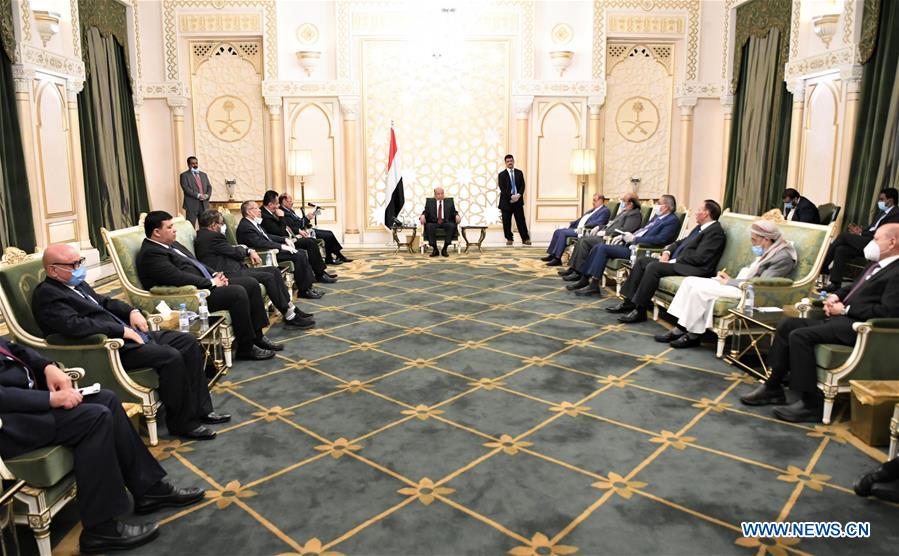
Yemen's President Abd-Rabbu Mansour Hadi (C) chairs a meeting with his advisors and several high-ranking government officials in Saudi Arabia's capital of Riyadh, on June 27, 2020. Yemen's internationally-recognized President Abd-Rabbu Mansour Hadi on Saturday urged the Southern Transitional Council (STC) to stop violence and return to implement a power-sharing deal brokered by Saudi Arabia last year. Hadi chaired a meeting with his advisors and several high-ranking government officials including members of the country's parliament to discuss the situation and the latest developments in the war-ravaged Arab country. (Str/Xinhua)
ADEN, Yemen, June 27 (Xinhua) -- Yemen's internationally-recognized President Abd-Rabbu Mansour Hadi on Saturday urged the Southern Transitional Council (STC) to stop violence and return to implement a power-sharing deal brokered by Saudi Arabia last year.
Hadi chaired a meeting with his advisors and several high-ranking government officials including members of the country's parliament to discuss the situation and the latest developments in the war-ravaged Arab country.
During the meeting, organized in Saudi Arabia's capital of Riyadh, Hadi called on the Aden-based STC to return to implementing the power-sharing deal as the only solution to stop the bloodshed in the country and unite efforts to fight the Houthi rebels.
He said that the "implementation of the Riyadh agreement has long faltered as a result of the continuation of escalatory practices."
He also stressed that "resorting to arms and force to achieve personal gains or regional projects will not be acceptable...and Yemen's people will be always present to defend their republican system and protect their national gains."
The Yemeni president said Yemen and Saudi Arabia both "face great and common challenges and lots of coordination, patience and hard work is needed to overcome them."
In April, the STC leaders announced a plan for implementing a self-ruled administration in the country's southern port city of Aden and other southern provinces.
The STC's self-governance declaration escalated the tensions with Yemen's government that mobilized hundreds of troops to Aden, sparking armed confrontations in Abyan.
Last year, Saudi Arabia persuaded the STC and Yemen's government to hold reconciliation talks, which succeeded in reaching a deal to form a new technocrat cabinet of no more than 24 ministers.
But numerous obstacles prevented the implementation of the deal's provisions, including failure to form a new government or achieving permanent stability in the country's southern part.
The main points of the deal also included the return of the exiled Yemeni government to Aden and the unification of all military units under the authority of the country's interior and defense ministries.
The Saudi-brokered deal excluded the Iranian-backed Houthis who are still controlling the capital Sanaa and other northern provinces of the war-torn Arab country.
The impoverished Arab country has been locked in a civil war since late 2014, when the Houthis overran much of the country and seized all northern areas including Sanaa.



